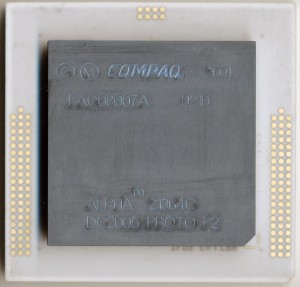Compaq 21364 Processor – The Omega of the Alpha
The DEC Alpha was one of the fastest processors of the 1990’s. The original 21064, manufactured in CMOS, rivaled the fastest ECL processors and blew away most everything else. Clock speeds were 150-200MHz (eventually hitting 275MHz) at a time when a standard Intel PC was hitting 66MHz, at the very top end. It was manufactured on a 0.75u process using 1.68 million transistors. The Alpha was a 64-bit RISC design, at a time when 16-bit computing was still rather common. This gave the architecture a good chance at success and a long life.
The 21064 was followed by the 21164 in 1995 with speeds up to 333MHz on a 0.5u process, now using 9.3million transistors. It added an on die secondary cache (called the Scache) of 96KB as well as 8KB instruction and Data caches. These accounted for 7.2 million transistors; the processor core itself was only around 2.1 million, a small increase over the 21064. At the time the main competition was the Pentium Pro, the HP PA8800 and the MIPS R10000. Improved versions were made by both DEC and Samsung, increasing clock speeds to 666MHz by 1998.
In 1996 DEC released the next in the series, the 21264. The 21264 dropped the secondary cache from the die, and implemented it off chip (now called a Bcache). The level 1 caches were increased to 64KB each for instruction and data resulting in a transistor count rise to 15.2 million, 9.2 million of which were for the cache, and the branch prediction tables. Frequency eventually reached 1.33GHz on models fab’d by IBM. However the end of the Alpha had already begun. DEC was purchased by Compaq in 1998, in the midst of the development of the enhanced 21264A. Compaq was an Intel customer, and Intel was developing something special to compete with the Alpha.


